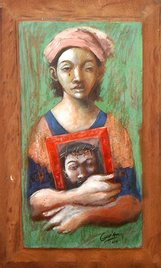Workshop: Organising between autonomy and care crisis
Migrant domestic work: Critical review and perspectives of collective action
7 – 8 September 2007 in Hamburg, Curio-Haus
Who is cleaning and ironing at home and takes care for children, granny
and the cats? If the nation’s key players do not accomplish this work
migrant domestic workers step in. It is talked of a future growth industry.
In Germany today there are about four million employments in private
households. This boom is borne by the workers:Their frequently informal
status produces a high risk of exploitation and vulnerability. Under these
conditions defence seems difficult – but still domestic workers have
developed tactics and strategies of resistance and have in other European
countries even found trade union like interest groups.
Meanwhile even in Germany diverse research projects have brought to light
the hyper-precarious modes of existence in the field of migrant domestic
work and care work. However, it has become silent around the political
networking and public actions among other things by migrant self-
organisations which engaged in this topic some years ago. We again take
this as a course for rethinking forms of organisation and intervention. The
workshop is therefore aimed at persons and groups who work or have
worked socially, politically or culturally towards an improvement of the
situation of domestic workers. Starting from the different approaches of
migrant self organisation,we will discuss the contradictions between the
fight for rights, the interests of domestic workers and institutional agency:
Which topics are in the focus of self organisation? How does the question of
interest representation in the field of (domestic) work relate to other areas
of life? Which political perspectives and claims are there? Which alliances
are regarded possible? Does the discussion about precarisation open up
new spaces or are specific conditions of domestic work or care work (again)
not taken into account? How does the claim for global social rights and
legalisation relate to the necessary redistribution of essential societal work?
The organiser's backgrounds and orientations are different: They come from
scientific and activist projects; their standpoints are feminist, focussed on
migration and/or work policy. Some of them hope for a discussion on
precarisation and the networks developing from it. The others are wondering
why there is no relevant feminist movement critically encountering the
devaluation of care work.
The marginalisation of care work is an outcome of capitalist locational
policy. But in which practices does this result? We are curiously looking at
discussions within trade unions, in which they articulate their interest in
those workers who do not count to their traditional clientele. The workshop
shall contribute to thinking and acting outside one's movement's boxes.
The workshop can and should be the start for further local, federal
and/or European networking. A registration for the workshop is requested.
* The workshop is a co-operation between three projects: The project
„Precarisation and Collective Organising“ („Prekarisierung und kollektive
Organisierung“ funded by the Rosa-Luxemburg-Foundation) and Preclab
Hamburg and the European project „Integration of female migrant domestic
workers“ (Sabine Hess, University of Munich and Mone Spindler,
Institute for Social Infrastructure, Frankfurt am Main)
Programme
Friday, 7 September 2007
19:00
Individual capacities of action and collective organising – contradictions and
perspectives in local initiatives
- Mujeres sin Fronteras (Hamburg)
- Luzenir Caixeta (MAIZ, Linz)
Afterwards Buffet and
- Clips from the documentary film „Haus – Halt – Hilfe“ (Petra Valentin, 2006)
- Documentary "Ibasura! Down down!- Philippine women working as
domestic helpers in Hong Kong" (Antje Grez, 2007)
Saturday, 8 September 2007
10.15 – 12.30
Global social rights and redistribution of essential societal work?
Experiences and perspectives of self-organising and in institutions
- Respect Berlin
- Respect Europe
- Mary Lou U. Hardillo-Werning (Philippine Women’s Forum e.V. BABAYLAN)
Coffee break
12.45- 14.15
The state’s and others’ interests in good care and integration
- Barbara Thiessen (German Youth Institute, DJI, Munich): Critical reflection
of so far attempts to regularise house and care work
- Helma Lutz (University of Muenster, Germany): The new European market
for migrant domestic work. Requirements for a gender and migration aware
analysis
- Hannes Heiler (Selbst e.V., Frankfurt): Contradictions between movements
of disabeld persons and the fight for rights of domestic workers?
Lunch break
15.15 – 16.45
Perspectives of organising within and outside trade unions
- Janette Vallejo Santes (AMIC-UGT, Barcelona)
- Emilija Mitrovic (ver.di-AK undokumentiertes Arbeiten, Hamburg)
- Kate Roberts (Kalayaan, London)
Coffee break
17.00 – 18.30
Repolitisation of domestic work and care work. Where are possible alliances?
- Zagas Berlin (PILOT-Projekt)
- Efthimia Panagiotidis (euromayday, organizing, Hamburg) etc.
Please register until 29 August 2007 via email or fax with:
Mone Spindler, ISIS Institut fuer Soziale Infrastruktur
Kasseler Str. 1a, D-60486 Frankfurt am Main
Tel.: 0049-(0)69-26486514, Fax: 0049-(0)69-26486519
Email: spindler@isis-sozialforschung.de
Registration for the workshop:
Organising between autonomy and care crisis
Migrant domestic work: Critical review and perspectives of collective action
7 – 8 September 2007
Curio-Haus, Rothenbaumchaussee 15 (backyard), 20148 Hamburg, Germany
Wednesday, September 05, 2007
Sunday, September 02, 2007
Internationales Begegnungsfest in Bonn




"Would you like to taste exotic food, hear foreign music and
learn about unknown culture? Then come to this ' learning
by playing' international festival in Rheinaue in Bonn on
September 1, 2007," reads the invitation to this
yearly international summer festival in Bonn.
Some 90 associations including NGOs and institutions
participated in this year festival of food, cultural
shows and information at the Freizeitspark Rheinaue Bonn
on September 1, 2007.
And as in every year, the most represented country
is the Philippines with stalls and stands of food offering
fingergoodies from from grilled tilapia to lechon.
"A taste of home, once a year", commented one Pinay
while searching for delicacies to go and found chicharon
(cracklings) and bought one plastic glass of halo-halo,
pichi-pichi and a serving of rice with sisig.

Cooking with style!

Eating Tilapia ala Kamayan

Were you looking for our booth?


Subscribe to:
Comments (Atom)



